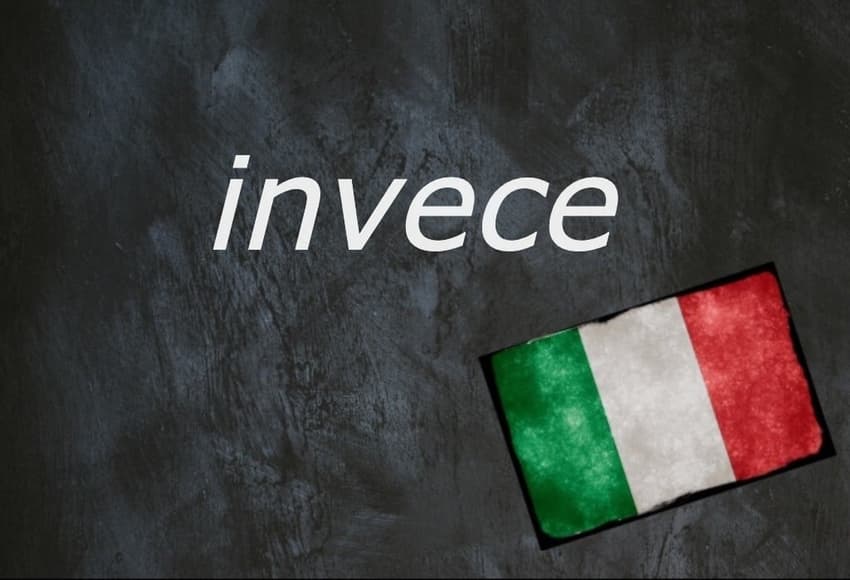Italian word of the day: 'Invece'

There's nothing mysterious about this word; on the contrary, it's quite straightforward.
Even if you've only just started learning Italian, the chances are you will have encountered the word ma ('but') by now.
But there's more than one way to contradict yourself or others, especially in Italian. Today's word is a commonly used alternative: invece (pronunciation available here).
In its simplest sense, it too means 'but'.
Pensavo che fosse partita, invece era ancora lì.
I thought she had gone, but she was still there.
Invece can also mean a few more things though. Followed by di, it means 'instead of'...
Prendo un tè invece del caffè.
I'll have tea instead of coffee.
Invece di lamentarti, datti da fare!
Instead of complaining, get on with it!
...while adding che turns it into 'rather than'.
Preferirei lavorare in Italia invece che in Francia.
I'd prefer to work in Italy rather than in France.
Ho deciso di venire qui di persona, invece che parlare al telefono.
I decided to come in person, rather than speaking on the phone.
Invece is also used to contrast two ideas or subjects, similarly to 'on the contrary' or 'on the other hand'.
Ti ho rimproverato per molte tue azioni: per questa invece ti lodo.
I've reproached you for many of your actions; for this one, on the contrary, I applaud you.
Io preferisco i romanzi, Simona invece i film.
I like novels, Simona on the other hand likes films.
It's very common to hear invece used this last way in spoken Italian: at a restaurant, for instance, a waiter might take one person's order then turn to the rest of the group and ask: "E voi, invece?" ('And as for you?').
There's one more use we seem to come across, and that is: e invece... Think of it as saying 'and yet...' and trailing off.
Mi avevi detto che mi amavi e che saresti rimasto con me. E invece...
You told me that you loved me, and that you'd stay with me. And yet...
It serves to show – usually somewhat pointedly – that whatever you've just described wasn't quite how things turned out.
You can also add sì or no as necessary ('and yet it was', 'and yet it wasn't').
Do you have an Italian word you'd like us to feature? If so, please email us with your suggestion.
Don't miss any of our Italian words and expressions of the day by downloading our new app (available on Apple and Android) and then selecting the Italian Word of the Day in your Notification options via the User button.
Comments
See Also
Even if you've only just started learning Italian, the chances are you will have encountered the word ma ('but') by now.
But there's more than one way to contradict yourself or others, especially in Italian. Today's word is a commonly used alternative: invece (pronunciation available here).
In its simplest sense, it too means 'but'.
Pensavo che fosse partita, invece era ancora lì.
I thought she had gone, but she was still there.
Invece can also mean a few more things though. Followed by di, it means 'instead of'...
Prendo un tè invece del caffè.
I'll have tea instead of coffee.
Invece di lamentarti, datti da fare!
Instead of complaining, get on with it!
...while adding che turns it into 'rather than'.
Preferirei lavorare in Italia invece che in Francia.
I'd prefer to work in Italy rather than in France.
Ho deciso di venire qui di persona, invece che parlare al telefono.
I decided to come in person, rather than speaking on the phone.
Invece is also used to contrast two ideas or subjects, similarly to 'on the contrary' or 'on the other hand'.
Ti ho rimproverato per molte tue azioni: per questa invece ti lodo.
I've reproached you for many of your actions; for this one, on the contrary, I applaud you.
Io preferisco i romanzi, Simona invece i film.
I like novels, Simona on the other hand likes films.
It's very common to hear invece used this last way in spoken Italian: at a restaurant, for instance, a waiter might take one person's order then turn to the rest of the group and ask: "E voi, invece?" ('And as for you?').
There's one more use we seem to come across, and that is: e invece... Think of it as saying 'and yet...' and trailing off.
Mi avevi detto che mi amavi e che saresti rimasto con me. E invece...
You told me that you loved me, and that you'd stay with me. And yet...
It serves to show – usually somewhat pointedly – that whatever you've just described wasn't quite how things turned out.
You can also add sì or no as necessary ('and yet it was', 'and yet it wasn't').
Do you have an Italian word you'd like us to feature? If so, please email us with your suggestion.
Don't miss any of our Italian words and expressions of the day by downloading our new app (available on Apple and Android) and then selecting the Italian Word of the Day in your Notification options via the User button.

Join the conversation in our comments section below. Share your own views and experience and if you have a question or suggestion for our journalists then email us at [email protected].
Please keep comments civil, constructive and on topic – and make sure to read our terms of use before getting involved.
Please log in here to leave a comment.